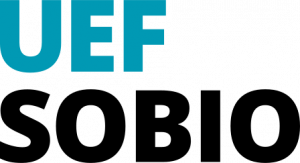SOBIO Days 2018
SOBIO Days 2018
Time: 22-23 October 2018
Venue: Metria, Joensuu Campus
Let’s raise the visibility and impact of a social-scientific view on the bioeconomy!Our multidisciplinary research network, SOBIO, is taking its first steps. You are warmly invited to join the SOBIO Days 2018 to develop the network further and discuss how you could benefit from and contribute to our network on social scientific circular and bioeconomy research. Registration is open until October 18th. SOBIO constitutes one of the research networks of UEF Bioeconomy Research Networks and it is a vital part of the LYY network: The Institute for Natural Resources, Environment and Society (LYY).
PROGRAMME
Monday 22nd October at University of Eastern Finland, Joensuu, Metria building, M11
09.00 – 9.15 Welcoming words by Irmeli Mustalahti
9.15 – 10.30 THE ROLE OF BIOECONOMY IN GREEN TRANSITIONS. Keynote Speech by Bjørnar Sæther. Comments by Rauno Sairinen. Slides here: Saether_pp_SobioDays2018
10.30 – 12.00 Researcher presentations and discussion. Facilitated by Moritz Albrecht and Jouni Paavola.
- Topi Turunen (UEF): “The concepts of waste and non-waste in the circular economy”
- Helen Reijonen (UEF): “Incentives and barriers to sort household waste”
- Henna Konu (UEF): “Understanding customer perspectives of nature-based
- Moritz Albrecht (UEF): “Regional Bioeconomy Assemblages: Unfolding spatialities of bioeconomy governance”
12.00 – 13.00 Lunch
13.00 – 17.15 Researcher presentations and discussion with a coffee break. Facilitated by Moritz Albrecht and Bjørnar Sæther.
- Päivi Pelli (UEF): “On the verge of interdisciplinary crossover: transitions to bio, circular, green and service economy”
- Taru Peltola (SYKE): “Towards more inclusive sustainability transitions: Experimenting with school food”•
- Irmeli Mustalahti (UEF): “Cross-generational capabilities and collaboration towards responsive bioeconomy”
14.45 – 15.15 Coffee break
- Lea Ranacher (BOKU, Vienna): “Researching the societal perception of the forest-based sector in context of a bioeconomy” Slides: Ranacher_pp_SobioDays2018
- Jakob Donner-Amnell (UEF): “Tension within a global regime: interpreting the change of the Finnish forest-based industry 1996-2018”
- Denis Dobrynin (UEF): “Free, Prior and Informed Consent (FPIC) as a tool for responsibilisation? Observations on the actors of FSC forest certification: The case of Russia“
- Janni Kunttu (UEF): “Maximizing climate benefits of wood products in Finland: A participative backcasting study on the uses of wood”
17.15 – 17.45 Wrap up discussion. 18.00 ”Get together”- Dinner
Tuesday 23rd October at University of Eastern Finland, Joensuu, Metria building, M109
9.00 – 9.30 Words of welcome and introduction of the participants.
9:30 – 10.30 TOWARDS SOCIALLY SUSTAINABLE BIOSOCIETY. Jouni Paavola opens the discussion with a keynote speech. Comments by Tapio Määttä. Slides: Paavola_pp_SobioDays2018
10.30 – 11.00 Introduction of SOBIO network by Irmeli Mustalahti and Moritz Albrecht
11:00 – 12:00 WHY INTERDISCIPLINARY RESEARCH NETWORKS ARE NEEDED? Kaisa Korhonen-Kurki opens the discussion by sharing her experience of research networks. Slides: Korhonen_pp_SobioDays2018
12.00 – 13.00 Lunch
12.00 – 15.00 Future of SOBIO network – Brainstorming session: Facilitated by Teppo Hujala.
15:00 – 16:00 First steps of SOBIO network – Take home points by Raija Komppula, Jarmo Kortelainen and Ismo Pölönen
Information about the invited speakers:
Bjørnar Sæther, University of Oslo, Department of Sociology and Human Geography. Sæther is a professor in human/economic geography with research expertise in rural innovation, agro-food systems and resource-based industries. His focus is particularly on a Nordic perspective. He has edited books such as ‘Nordic food transitions. Towards a territorialized action space for food and rural development’ (2018) and ‘Politics of forests. Northern forest industrial regimes in the age of globalization’ (2004), and has published numerous articles on aspects related to resource industries, their development and innovation approaches in rural and peripheral areas. Sæther teaches evolutionary economic geography, economic globalization, regional development and the role of green innovations in an age of global environmental change. He has advised numerous Masters and Phd students.
Jouni Paavola is Professor of Environmental Social Science and Co-Director of the UK Economic and Social Research Council (ESRC) funded Centre for Climate Change Economics and Policy (CCCEP) in the School of Earth and Environment at the University of Leeds in the United Kingdom. His research interests focus on environmental governance institutions and their environmental, economic and social justice implications, particularly with regard to climate change, biodiversity and ecosystem services. He has authored and co-authored over 70 peer-reviewed articles from his research published in journals such as Science, Ecology and Society, Ecological Economics and Energy Policy. He was a member of the Scientific Committee of the European Environment Agency (EEA) in 2008-2016 and is a member of the editorial boards of Ecological Economics and Environmental Policy and Governance, and Section Editor of Global Sustainability, a new Cambridge University Press journal.
Kaisa Korhonen-Kurki, PhD Adjunct professor, works as a program director for Strategic Research Council (STN) programs of “Adaptation and Resilience for Sustainable Growth”, “Changing Society and Active Citizenship” and “Keys to Sustainable Growth” as well as being a research coordinator at the Helsinki Institute of Sustainability Science HELSUS, in the University of Helsinki. Korhonen-Kurki has a long experience in science policy work; she is a founding member of national science-policy platform for environment (Ympäristötiedon foorumi) as well as a member of the leadership council in the UN’s Sustainable Development Solution Network Northern Europe. Her background is in environmental policy research concerning climate and forest governance, sustainability transformation and co-production of knowledge. She has worked as a scientist in a climate policy unit at the Center for International Forestry Research, CIFOR, in Indonesia. She has over 10 years’ experience on working and coordinating interdisciplinary research networks in sustainability science.
